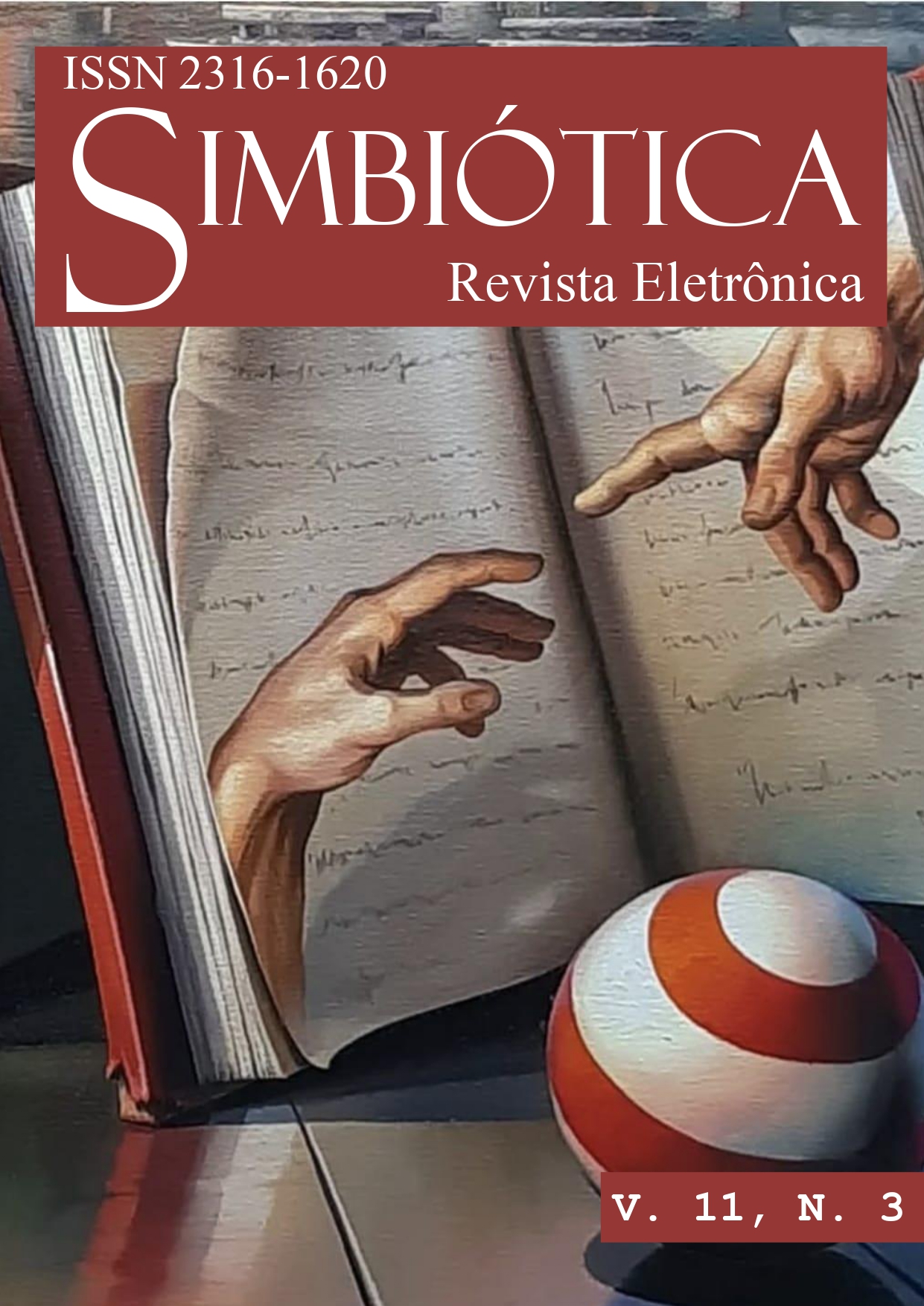"E... a verdade vos libertará..."
ensaiando um contraponto entre as noções de verdade e emancipação a partir da hermenêutica gadameriana e do realismo crítico
DOI:
https://doi.org/10.47456/simbitica.v11i3.42742Palavras-chave:
hermenêutica gadameriana, realismo crítico, verdade, emancipaçãoResumo
Este ensaio procura ouvir, entre as muitas vozes melódicas que conversam entre si no campo da metodologia das ciências sociais, duas das que pareceram soar mais discerníveis, à luz do contexto sociopolítico brasileiro dos anos recentes: a hermenêutica gadameriana e o realismo crítico. Buscando argumentar que há margens para se pensar a verdade, na filosofia de Hans-Georg Gadamer, como condição para a emancipação proposta pela filosofia realista de Roy Bhaskar, apresenta quatro seções: a primeira, que rememora o contexto no qual as filosofias de Gadamer e Bhaskar soaram como possibilidade de conversarem entre si; a segunda e a terceira, nas quais se abordam seus aspectos gerais, com realce para as noções de verdade, em Gadamer, e de emancipação, na crítica explanatória de Bhaskar; e, por fim, a quarta seção, que apresenta alguns dos pontos de convergência entre elas, a partir dos quais um “ensaio contrapontístico” parece despontar como possível.
Referências
Alexander, Jeffrey. (2018). “Vociferando contra o Iluminismo: a ideologia de Steve Bannon”, Sociologia & Antropologia, v. 08, n. 03, pp. 1009-1023. [Consult. 08-02-2019]. Disponível em https://doi.org/10.1590/2238-38752018v8310
Alonso, Angela. (2019). “A comunidade moral bolsonarista”, in S. Abranches, et al. Democracia em risco: 22 ensaios sobre o Brasil hoje. São Paulo, Companhia das Letras, pp. 52-70.
Apel, Willi (1974). Harvard Dictionary of Music. 2. ed. Cambridge/MA, Harvard University Press.
Archer, Margaret. (2000). “Realismo e o problema da agência”, Estudos de Sociologia, v. 6, n. 2, pp. 51-75 [Consult. 30-01-2019]. Disponível em https://periodicos.ufpe.br/revistas/index.php/revsocio/article/view/235467/28455
Archer, Margaret; Collier, Andrew; Porpora, Douglas. (2004). Transcendence: critical realism and God. Routledge, London and New York.
Barthold, Lauren Swayne. (2012). “Hans-Georg Gadamer (1900 – 2002)”. Internet Encyclopedia of Philosophy: a Peer-Reviewed Academic Resource. [Consult. 06-02-2019]. Disponível em https://iep.utm.edu/gadamer/
Benton, Ted; Craib, Ian. (2011), Philosophy of Social Science: the philosophical foundations of Social Thought. 2. ed. New York, Palgrave Macmillan.
Bhaskar, Roy. (1998). The possibility of naturalism: a philosophical critique of the contemporary Human Sciences. 3. ed. London/New York, Routledge.
Bhaskar, Roy. (2008). A realist theory of science. London/New York, Routledge.
Bhaskar, Roy. (2009). Scientific realism and human emancipation. London/New York, Routledge.
Bhaskar, Roy; Collier, Andrew. (1998). “Introduction: explanatory critiques”, in M. Archer; R. Bhaskar; A. Collier; T. Lawson; A. Norrie. Critical realism: essential readings. London/New York, Routledge, pp. 385-394.
Bourgault, Sophie. (2020). “Democratic practice and ‘caring to deliberate’: a Gadamerian account of conversation and listening”, in P. Urban; L. Ward (eds.). Care ethics, democratic citizenship and the State. London, UK, Palgrave Macmillan, pp. 31-52.
Brante, Thomas. (2001). “Consequências do realismo crítico na construção de teoria sociológica”, Sociologia, Problemas e Práticas, n. 36, pp. 9-38 [Consult. 15-02-2019]. Disponível em https://repositorio.iscte-iul.pt/bitstream/10071/406/1/36.01.pdf
Bunnin, Nicholas; Yu, Jiyuan. (2004). “Idealism”. The Blackwell Dictionary of Western Philosophy. Malden (USA) / Oxford (UK) / Carlton (Australia), Backwell Publishing, pp. 322-324.
Carpeaux, Otto Maria. (2009). O livro de ouro da história da música: da Idade Média ao século XX. Rio de Janeiro, Ediouro.
Collier, Andrew. (1998). “Explanation and emancipation”, in M. Archer; R. Bhaskar; A. Collier; T. Lawson; A. Norrie. Critical realism: essential readings. London/New York, Routledge, pp. 444-472.
Darren, Walhof. (2017). The democratic theory of Hans-Georg Gadamer. Michigan, Palgrave Macmillan.
Davey, Nicholas. (2006). Unquiet understanding: Gadamer’s philosophical hermeneutics. New York, State University of New York Press.
Dostal, Robert J. (ed.). (2002). “Gadamer: the man and his work”, in Dostal R. J. (ed.). The Cambridge Companion to Gadamer. Cambridge, Cambridge University Press, pp. 13-35.
Gadamer, Hans-Georg. (1977). “Theory, technology, practices: the task of the Science of Man”, Social Research, v. 44, n. 3, pp. 529-561 [Consult. 18-02-2019]. Disponível em https://www.jstor.org/stable/40970297
Gadamer, Hans-Georg. (2002). Verdade e método II: complementos e índice. Trad. de Enio Paulo Giachini. Petrópolis, Vozes.
Gadamer, Hans-Georg. (2006). Truth and method. 2. ed. Translation revised by Joel Weinsheimer and Donald G. Marshall. London/New York, Continuum.
Gadamer, Hans-Georg. (2007). “The incapacity for conversation”: Continental Philosophy Review, v. 39, n. 4, pp. 351-359 [Consult. 18-02-2019]. Disponível em https://link.springer.com/article/10.1007/s11007-006-9041-2
Gadamer, Hans-Georg. (2009). “Friendship and solidarity”, Research in Phenomenology, v. 39, n. 3, pp. 3-12 [Consult. 18-02-2019]. Disponível em https://brill.com/view/journals/rip/39/1/article-p3_1.xml
Gadamer, Hans-Georg. (2012). La actualidad de lo bello: el arte como juego, símbolo y fiesta. Buenos Aires: Paidós.
Gander, Hans-Helmuth. (2015). “Gadamer: the universality of hermeneutics”, in J. Malpas; H.-H. Gander (eds.). The Routledge Companion Hermeneutics. London/New York, Routledge, pp. 137-148.
Grondin, Jean. (1999). Introdução à hermenêutica filosófica. Trad. de Benno Dischinger. São Leopoldo, Unisinos.
Hamlin, Cynthia L. (1999). “A hermenêutica romântica de Wilhelm Dilthey”, Estudos de Sociologia, v. 2, n. 4.
Hamlin, Cynthia L. (2000). “Realismo crítico: um programa de pesquisa para as ciências sociais”. In: Dados, v. 43, n. 2 [Consult. 10-02-2019]. Disponível em https://doi.org/10.1590/S0011-52582000000200006
Hamlin, Cynthia L. (2014). “Uma hermenêutica das conversações interiores: a noção de sujeito em Margaret Archer e em Hans-Georg Gadamer”. Revista Brasileira de Sociologia, v. 2, n. 4, pp. 13-47 [Consult. 10-02-2019]. Disponível em https://rbs.sbsociologia.com.br/index.php/rbs/article/view/118/52
Hamlin, Cynthia L. (2016). “An exchange between Gadamer and Glenn Gould on hermeneutics and music”. Theory, Culture & Society, v. 0, n. 0, pp. 1-20 [Consult. 10-02-2019]. Disponível em https://journals.sagepub.com/doi/abs/10.1177/0263276415576218
Hamlin, Cynthia L. (2017). “Realismo crítico”, in C. E. Sell; C. B. Martins. Teoria sociológica contemporânea: autores e perspectivas. São Paulo, Annablume, pp. 47-74.
Hammermeister, Kai. (2006). “Gadamer, Hans-Georg (1900-2002)”, in J. Merriman; J. Winter (eds.). Europe since 1914: Encyclopedia of the age of war and reconstruction. v. 3. New York, Charles Scribner’s Sons/Thomson Gale, pp. 1159-1160.
Kahlmeyer-Mertens, Roberto S. (2017). 10 lições sobre Gadamer. Petrópolis, Vozes.
Kakutani, Michiko. (2018). A morte da verdade: notas sobre a mentira na era Trump. Trad. de André Czarnobai e Marcela Duarte. Rio de Janeiro, Intrínseca.
Kapilow, Rob. (2008). All you have to do is listen: music from the inside out. New Jersey, John Wiley & Sons.
Koskela, Jani. (2012). “Truth as unconcealment in Heidegger’s Being and Time”, Minerva: An Internet Journal of Philosophy, v. 16, pp. 116-128. [Consult. 13-02-2019]. Disponível em http://www.minerva.mic.ul.ie/vol16/Heidegger.pdf
Krell, David Farrell (ed.). (1993). Martin Heidegger: basic writings. New York, HarperSanFrancisco.
Lawn, Chris (2004), Wittgenstein and Gadamer: towards a post-analytic philosophy of language. London/New York, Continuum.
Lawn, Chris. (2006). Gadamer: a guide for the perplexed. London/New York, Continuum International Publishing Group.
Machado de Assis, Joaquim M. (1882). O Alienista. Rio de Janeiro, Fundação Biblioteca Nacional – Departamento Nacional do Livro.
Malpas, Jeff. (2018). “Hans-Georg Gadamer”. The Stanford Encyclopedia of Philosophy [Consult. 20-10-2018]. Disponível em http://plato.stanford.edu/entries/gadamer/.
Misgeld, Dieter; Nicholson, Graeme (eds.). (1992). Hans-Georg Gadamer on education, poetry, and history: applied hermeneutics. Albany, State University New York Press.
Palmer, Richard. (1969). Hermeneutics: interpretation theory in Schleiermacher, Dilthey, Heidegger, and Gadamer. Evanston, Northwestern University Press.
Ramberg, Bjorn; Gjesdal, Kristin. (2016). “Hermeneutics”. The Stanford Encyclopedia of Philosophy [Consult. 08-10-2018]. Disponível em https://plato.stanford.edu/entries/hermeneutics/
Roehe, Marcelo Vial; Dutra, Elza. (2014). “Dasein, o entendimento de Heidegger sobre o modo de ser humano”, Avances en Psicología Latinoamericana, v. 32, n. 1, pp. 105-113.
Sayer, Andrew. (2000). “Características-chave do realismo crítico na prática: um breve resumo”, Estudos de Sociologia, v. 6, n. 2, pp. 7-32. [Consult. 18-01-2019]. Disponível em https://periodicos.ufpe.br/revistas/index.php/revsocio/article/view/235465/28453
Scheibler, Ingrid. (2000). Gadamer: between Heidegger and Habermas. London/Boulder/New York/Oxford, Rowman & Littlefield Publishers.
Scocuglia, Jovanka B. C. (2002). “A hermenêutica de Wilhelm Dilthey e a reflexão epistemológica nas ciências humanas contemporâneas”, Sociedade e Estado, v. 17, n. 2, pp. 249-281 [Consult. 18-01-2019]. Disponível em https://doi.org/10.1590/S0102-69922002000200003
Vandenberghe, Frédéric. (2010). Teoria social realista: um diálogo franco-britânico. Belo Horizonte/Rio de Janeiro, Editora UFMG/IUPERJ.
Vandenberghe, Frédéric. (2014). “O maremoto do realismo crítico”, Teoria e Cultura, v. 9, n. 1, pp. 8-30 [Consult. 20-01-2019]. Disponível em https://periodicos.ufjf.br/index.php/TeoriaeCultura/article/view/12204
Vessey, David. (2009). “Gadamer and the fusion of horizons”, International Journal of Philosophical Studies, v. 17, n. 4, p. 531-542 [Consult. 20-01-2019]. Disponível em https://doi.org/10.1080/09672550903164459
Weiss, Raquel. (2014). “Max Weber e o problema dos valores: as justificativas para a neutralidade axiológica”, Revista de Sociologia e Política, v. 22, n. 49, pp. 113-137 [Consult. 10-01-2019]. Disponível em https://doi.org/10.1590/S0104-44782014000100007
Downloads
Publicado
Edição
Seção
Licença
Copyright (c) 2024 Carla V. Ribeiro Sales

Este trabalho está licenciado sob uma licença Creative Commons Attribution-NonCommercial 4.0 International License.
Autores que publicam nesta revista concordam com os seguintes termos:
a. Autores mantém os direitos autorais e concedem à revista o direito de primeira publicação, com o trabalho simultaneamente licenciado sob a Creative Commons - Atribuição-NãoComercial 4.0 Internacional.
b. Compartilhar - copiar e distribuir o material em qualquer meio ou formato.
Adaptar - remix, transformar e construir sobre o material para qualquer finalidade, inclusive comercial.
c. Autores têm autorização para assumir contratos adicionais separadamente, para distribuição não-exclusiva da versão do trabalho publicada nesta revista (ex.: publicar em repositório institucional ou como capítulo de livro), com reconhecimento de autoria e publicação inicial nesta revista.
d. Autores têm permissão e são estimulados a publicar e distribuir seu trabalho online (ex.: em repositórios institucionais ou na sua página pessoal) a qualquer ponto antes ou durante o processo editorial, já que isso pode gerar alterações produtivas, bem como aumentar o impacto e a citação do trabalho publicado (Veja O Efeito do Acesso Livre).
Authors who publish in this journal agree to the following terms:
a. Authors retain the copyright and grant the magazine the right of first publication, with work simultaneously licensed under the CCreative Commons - Atribuição-NãoComercial 4.0 Internacional.
b. Share - copy and distribute the material in any medium or format.
Adapt - remix, transform and build on the material for any purpose, including commercial.
c. Authors are authorized to take additional contracts separately, for non-exclusive distribution of the version of the work published in this journal (eg, publish in institutional repository or as a book chapter), with acknowledgment of authorship and initial publication in this journal.
d. Authors are allowed and encouraged to publish and distribute their work online (eg.: in institutional repositories or on their personal page) at any point before or during the editorial process, as this can generate productive changes as well as increase the impact and the citation of the published work (See The Effect of Free Access).












